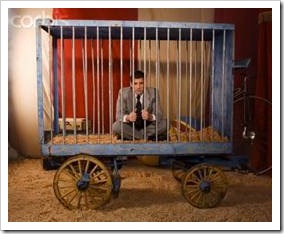
People in the approval trap have some common character traits, all related to fear (is there anything besides love and fear?). They lack significance, have low self-esteem and use attention-seeking behavior to gain more significance, although that cannot remove the fear or raise their self-esteem.
Trapped individuals have the idea that to be highly thought of by some important others, they need to stick out, gain superiority by making others feel inferior, pretend to be someone they are not or, in other cases, never take risks to avoid conflict and judgment.
Everyone is trapped somehow, but it is the magnitude of the problem that matters. Use the list of approval-seeking behaviors below to discover if you are trapped or not and how deep are you in the trap of approval.
Give each item a rating from 0 to 10 (0 means you never do it and 10 means you do it all the time). My suggestion is to focus on those you gave high scores, indicating you have that behavior and the next post will give great tips to change that and get yourself out of the trap.
- Immediately approving things others say
- Agreeing with others just to avoid a conflict
- Changing your mind easily with little pressure
- Changing your statements based on the audience
- Looking for ways to be seen by others – trying to be the center of the attention in parties, meetings and family gatherings
- Seeking recognition (awards, prizes, being the best)
- Never returning a faulty product (to avoid conflict)

- Needing company to succeed
- Ending sentences with a question (“It looks good, doesn’t it?”) or using a question tone for statements
- Being devastated by low scores on exams or bad reviews
- Blaming others for your feelings (“How can I be happy when she doesn’t like me?”)
- Pushing your kids to have high academic achievements (as a symbol of status)
- Having a bad relationship with your parents (every sad relationship with parents originates from disapproval. One of them did not approve of the other and this was the source of the conflict)
- Buying brand names
- Being scared to be alone
- Attention seeking behavior (for kids it is making noise or being a trouble maker. For grownups, it is doing the opposite of what the majority does or doing things excessively)
- Being subject to peer pressure
- Being very particular with your words to sound smart and knowledgeable
- Hesitating to share your opinion
- Compromising to gain popularity
- Being overly polite
- Being afraid to say “No” to someone asking you for something you do not want to give (like your time)
- Punishing your kids if someone complains about them but never asking the kids what really happened (kids are not a threat, but others are)
- Continually asking others to tell you what they think about you, your clothes, your new furniture, etc
- Drinking alcohol because your friends do
- Being jealous of the success of others (as if their success takes some of the attention away from you)
- Accepting invitations to events you do not want to attend
- Having a fear of authority (perceiving authority as power rather than inspiration or guidance)
- Telling others that you hold a secret you will not share to make yourself feel special (“I know something you don’t”)
- Being a follower rather than a leader
- Pointing out people’s mistakes (to look good compared to them)
- Thinking of yourself as “not good enough” (“enough” for who/what?)
- Flattering someone to get their approval (teachers’ pet)
- Not standing up for your rights
- Telling others you know something they do not and saying you can teach them that thing
- Blaming others for your life’s circumstances
- Calling others names to make them feel inferior and then feel better by comparison (“this stupid person”, “that was so dumb”)

- Lending money although you do not want to
- Being preoccupied with symbols of status
- Playing “one up” (anything you can do, I can do better)
- Continually searching for signs of appreciation
- Being afraid of doing funny things (to avoid being perceived as ridiculous)
- Not doing cute, innocent things for fear of being perceived as childish
- Playing Devil’s Advocate in discussions (must stick out somehow)
- Seeking compliments from others
- Humiliating others when they ask for a favor or help (low self esteem and aimed to feel important)
- Being afraid to tell about good things that happen to you in fear the others might say you are bragging
- Helping your friends move when you have something else to do
- Having special dishes for guests
- Not inviting guests home for fear of what they might say later about you and how you live
- Initiating conflicts and having constant arguments (using arguments to scare others and make them feel inferior for a false belief that this makes you superior)
- Feeling humiliated with low income (what will others say about me?)
- Smoking or taking drugs because others do
- Taking control over conversations (wanting others to think highly of you and using every opportunity to impress)
- Feeling humiliated around educated people for not having more education
- Exaggerating when telling stories about youself (to be perceived as more successful, more capable or richer)
- Staying in contact with people you do not like because you “have to” (parents, siblings, friends)
- Being competitive
- Witnessing injustice but never saying anything about it
- Manipulating people to give you what you want (thinking that getting what you want is approval)
- Looking for instant gratification and finding it hard to wait for things to happen your way (“If things do not happen the way I want, it may be a sign of disapproval”)

- Having to present your opinion on every occasion
- Coming late to every event (attention seeking)
- Cleaning the house in panic before guests come
- Apologizing too much
- When talking to others, using statements like “you must do this” or “you have to tell him” to boost your own confidence
- Worrying when someone disagrees with you (not being able to accept disagreements)
- Giving your spiritual leader the power to make decisions for you
- Being overly busy with other people’s ulterior motives (“I have to know what she really thinks”)
- Feelings shame
- Being shy – shyness is sometimes a result of fear of saying the wrong thing
- Feeling insult or humiliation when people express opinion that is an opposite to yours
- Being a drama queen (or king)
- Being a rescuer or a savior (to be liked by others)
- Being aggressive (using aggressiveness to hide low self esteem and scare others)
- Feeling self-pity – feeling sorry for yourself and saying it out loud (attention seeking)
- Hesitating to talk in front of others (did you know most people are more afraid of public speaking than death?)
- Pretending to be very busy when invited to events/gathering (so many people want me to come and I need to choose between them)
- Being anxious to know what others think about you
- Putting others down (thinking their bad position will give you an advantage)

- Having the fear of failure
- Being indecisive (looking for the perfect decision that will make you look best)
- Constantly asking permission from someone to do things (a sign of fear)
- Trying to control others (for fear of the others doing things differently)
- Saying others are “full of themselves” to make them look bad next to you
- Continually telling others what you expect from them (to feel strong, powerful and significant)
- Following the majority when making decisions (thinking that if most people do it, it is probably the right thing to do)
- Obsessively checking yourself over and over again before submitting something (proposal, test, assignment, report or article)
- Lying – every form of lying is done for approval. People lie to make themselves look good, because they think the truth will not be to their favor
- Feeling guilty
- Strictly clinging to tradition (safe and pre-approved!)
- Being angry with your family member or friend for choosing to move away and live in another place (their choice being an indication they do not agree with your choice to stay, which may have nothing to do with reality)
- Telling stories about bad things that are happening to you (must stick out somehow)

- Pretending to know something you do not (so others think highly of you)
- Bragging about yourself (the other side of seeking significance and attention)
Find out the behaviors you have and start working on the ones with the highest ratings.
Join me next week for some great solutions to get out of the approval trap.
Until next week, may the force be with you!
Ronit
This post is part of the series The Approval Trap:
- Approval Trap (1): Birth to Adulthood
- Approval Trap (2): Are you trapped?
- Approval Trap (3): Approval-Seeking Behavior
- Approval Trap (4): How to get yourself out
















